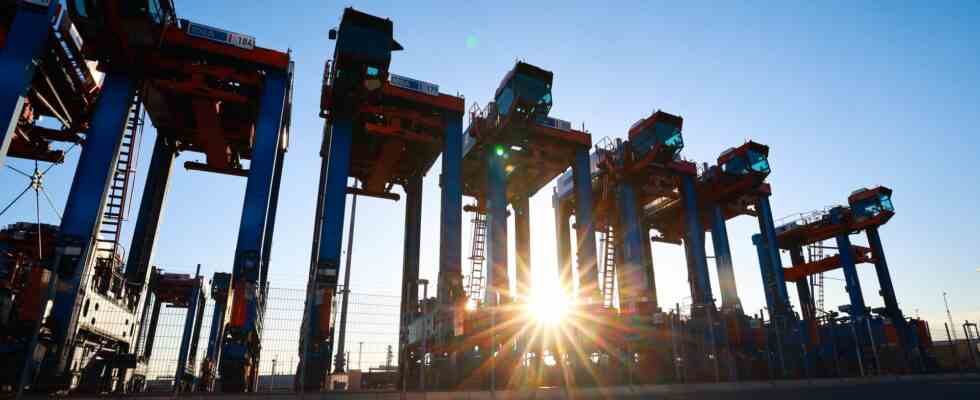Status: 11/24/2022 11:32 a.m
The mood in the German economy unexpectedly improved significantly in November. The pessimism in the boardrooms is decreasing. The recession is likely to be less severe than feared.
The mood in the executive floors of German companies brightened up surprisingly in November. The ifo business climate index rose to 86.3 points from the revised 84.5 points in the previous month, as the Munich ifo institute announced today in its survey of around 9,000 executives. Of Reuters surveyed economists had only expected 85.0 points.
Although companies were less satisfied with current business, the pessimism with regard to the coming months eased noticeably. “The recession is likely to be less deep than many had expected,” said ifo President Clemens Fuest.
Material bottlenecks decrease
The upward trend in the business climate ran through all sectors – from manufacturing and services to trade and construction. In addition, the value for the previous month was revised upwards. Accordingly, the most important German economic barometer had already risen in October for the first time since May.
One reason for this is decreasing material bottlenecks in the industry: In November, 59.3 percent complained about it, after 63.8 percent in October. “We are seeing a slow but steady decline in delivery bottlenecks,” said ifo economic expert Klaus Wohlrabe. “That helps the industry a bit, but there’s still room for improvement.”
Despite the weaker global economy, companies’ export expectations have also risen. They are now back in positive territory, “albeit only minimally,” says Wohlrabe. The hospitality industry also developed unexpectedly positively. “Despite high inflation, there is obviously a desire to eat well.” Retail is also sending out small signals of hope. “The state aid could have an effect here,” said the expert.
No reason to give the all-clear yet
“The German economy is sending out signs of hope. It’s doing better than expected,” said Wohlrabe. The winter recession could therefore be mild. In recent months, high inflation and supply chain problems have weighed heavily on the business climate.
“The recession is losing its terror,” commented chief economist Ulrich Kater from Dekabank. In his estimation, the uncertainty about the energy supply and thus the worries about the production conditions will decrease in the coming months. The Bundesbank had recently pointed out that a gas shortage in Germany could probably be avoided.
“The recession may remain mild, but the long-term challenges for German companies are not,” says Kater. From the point of view of LBBW economist Jens-Oliver Niklasch, there is no reason to give the all-clear: “We are moving out of the zone of fear of doom and into the area of normal fears of recession. The expectations were catastrophic, now they are just gloomy.”
Purchasing managers’ index and indicators of inflation also positive
According to estimates by the federal government, the Bundesbank and many economists, Germany is on the verge of a recession. In the summer months, the economy was still growing due to the lifting of many corona measures: Gross domestic product (GDP) increased by 0.3 percent from July to September. For the current winter quarter, however, GDP is likely to fall significantly.
The purchasing managers’ index for the private sector – industry and service sector together – also gave cause for hope yesterday. The barometer, which is highly regarded on the financial markets, rose by 1.3 to 46.4 points in November, according to the financial services provider S&P Global. There is reason to hope that the decline in economic output could be weaker than initially feared, according to S&P economist Phil Smith.
At the same time, the proportion of companies planning to increase their prices in the next three months is falling. In November, the share was 46.7 percent, after 51.3 percent in the previous month. Producer prices have also recently stopped rising for the first time since 2020. “The pressure to increase prices is decreasing somewhat,” said Ifo expert Wohlrabe. “But it’s still too early to give the all-clear on inflation.”

